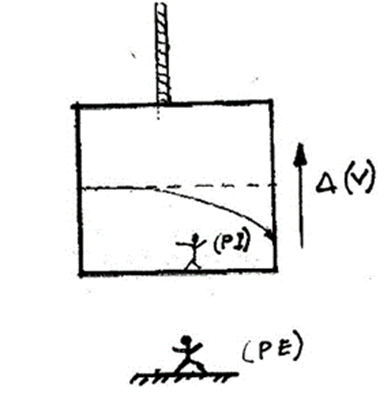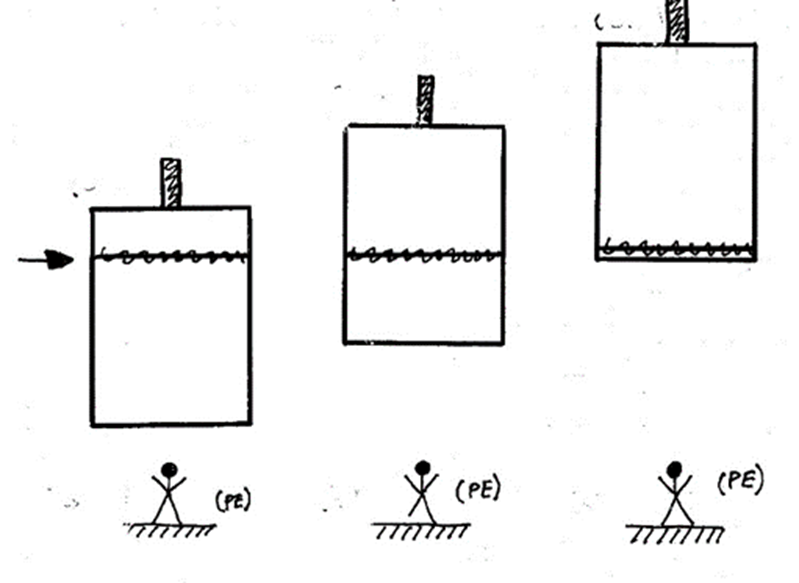INTRODUCTION
In our
previous essay we saw that, in the deflection of starlight, A. Einstein
attributed it to the “deformation of space.” A nonsense. With this assumption
it seemed that he found no other justification for committing such an
aberration.
However, in
the book by the authors: Albert Einstein and Leopold Infeld, entitled: “The
Evolution of Physics”, we find that they give another justification for the
aforementioned deflection of light. With this justification we ask ourselves:
did A. Einstein change his mind about the cause of the deflection of starlight
and abandon the fallacy of the “deformation of space”?... a scientific
historian would have to inform us of the coincidence chronology of both
opinions to clarify such contradiction.
The
transcriptions that we make from the aforementioned book, or from other
sources, will be written between quotation marks and in italics.
1.- A
REMINDER OF OUR PREVIOUS ESSAY
In our
previous essay titled: “The deformation of space – An error by A. Einstein”, we
exposed the error made by this Physicist when considering that: “the Gravity
caused by the sun curves space and this curvature causes the path to be
deformed. of the light of the stars.” We call the phenomenon of curvature of
the light path: deflection.
We present
the fallacy of this approach in the aforementioned essay with the following
comment and drawing taken from Google:
“Researchers
thought that the Sun, due to its Gravity, would curve space, in such a way that
this phenomenon would become noticeable in the perception of the position of
starlight”
Faced with
this thesis, which we demonstrate in the aforementioned essay to be a fallacy,
A. Einstein seems to try to rectify his error by exposing that the deflection
of starlight is caused directly by Gravity. Without involving “space” as a
mediator.
This is
what we will present, transcribing the mental experiment proposed in the book
by the aforementioned authors: Albert Einstein and Leopold Infeld, entitled:
“The evolution of physics”, on pages 177 and 178,
The
conclusion of this thought experiment flies in the face of the claim that
attributes the deflection of starlight to the warping of space.
2.-
TRANSCRIPT OF THE TEXT OF THE MENTAL EXPERIMENT OF THE DEFLECTION OF LIGHT
Next, we
will transcribe the text of the thought experiment that the aforementioned
authors present in their book. In this transcription the reader will be able to
see that his text is a bit tangled. We would say that it is rather “twisted”.
To help
interpret the aforementioned thought experiment, in the following paragraph we
will tell our own story. Now we will only dedicate ourselves to transcribing
your text.
The text of
the thought experiment described in the reference book talks about an elevator
that “floats” in outer space. The elevator is pulled by a rope attached to its
ceiling, which accelerates it. It says that there are two observers. One inside
the elevator and one outside of it.
Its text is
the following:
“Let's
imagine that a horizontal ray of light enters the elevator through a side
window, reaching the opposite wall after a very short time. Let's see how the
path of light would be predicted by our observers."
The outside
observer, who believes in the accelerated movement of the elevator, will argue:
the light beam penetrates through the window, moving horizontally and in a
straight line towards the opposite wall. But the elevator moves upward,
changing position during the time the light lasts as it passes from one wall to
the other. The ray will not illuminate, therefore, the point exactly opposite
to that of its entrance, but rather a little lower. The difference, although
very small, is real and consequently it turns out that the light moves with
respect to the elevator on a curved line, like the figure we have drawn and not
on the dotted line of the same figure.
The inner
observer, who believes in the presence of a gravitational field acting on all
the objects in his elevator, would say: the elevator has no such accelerated
motion; A gravitational field simply acts inside it. A light beam that is
imponderable will not be affected by gravity. If it propagates in a horizontal
direction it will reach a point exactly opposite to that of its entrance.
It seems to
emerge from this discussion that there is a possibility of deciding between
both points of view, since the result would be different depending on whether
one statement or the other was true. If there is nothing illogical in any of
the reasoning that we have just presented, then all our previous argument falls
to the ground, making it impossible, therefore, to consistently describe all
the phenomena in question in two different ways: with or without a
gravitational field.
But there
is, fortunately, a serious error in the reasoning of the inner observer, which
saves our conclusion. This said: “a light beam that is imponderable will not be
affected by gravity. That's not true! A beam of light has energy and energy has
mass. But all inert mass is attracted by a gravitational field since inert mass
and gravitational mass are equivalent. A light beam will bend in a
gravitational field exactly as would the trajectory of a body launched
horizontally with a speed equal to that of light. Thus we see that, if the
interior observer had reasoned correctly, taking into account the curvature of
a light beam in a gravitational field, he would have arrived at the same result
as the exterior observer.
3.- OUR
ACCOUNT OF THE MENTAL EXPERIMENT THAT APPEARS IN THE MENTIONED BOOK.
To try to
facilitate the understanding of the approach of the aforementioned mental
experiment and at the same time declare an error that is committed in it, we
have chosen to develop its content as if it were a story, giving it an
argument.
We begin
our story:
The thought
experiment presents an elevator that ascends into outer space pulled by a rope.
Ascends with accelerated speed:
Inside the
elevator there is a person who we will identify as: PERSON INSIDE (PI).
Outside the
elevator there is an observer who we will identify as: PERSON OUTSIDE (PE)
In our
comments and opinions we will identify ourselves as: WE
We will
identify the piece that belongs to the text of the experiment as NARRATOR.
A ray of
light penetrates through the left wall of the elevator and ends its journey on
the right wall.
The PE
He believes
that the ascension of the elevator is what makes the curvature of light
perceived.
US
We say that
the (PE) is right in accepting the curvature of the ray of light.
But we
contradict him, and say that he is NOT right in the cause he alleges. Later we
will justify our opinion.
The (PI)
You don't
realize that:
The rope is
what moves the elevator. He attributes the fall of the masses (m) that are
inside the elevator to the existence of a Gravitational field.
But he
denies that the ray of light is curved due to Gravity and attributes it to a
straight path.
STORYTELLER
The
Narrator of the experiment says the following:
According
to the above, there is a conflict between what they think (PE) and (PI).
The (PE)
thinks that the ray of light bends.
The (PI)
thinks that gravity cannot bend the path of a ray of light, although gravity
acts on the masses (m) of the elevator.
US
In the end,
the authors of the thought experiment to justify the validity of gravity
exerting deflection on a ray of light, in their story, make the (PI) rectify
their opinion. In their text they say the following:
“…But there
is, fortunately, a serious error in the reasoning of the inner observer, which
saves our conclusion. This said: “a light beam that is imponderable will not be
affected by gravity.”
And now,
putting an end to this “novel” they say the following:
“A beam of
light has energy and energy has mass. But all inert mass is attracted by a
gravitational field since inert mass and gravitational mass are equivalent. A
light beam will bend in a gravitational field exactly as would the trajectory
of a body launched horizontally with a speed equal to that of light. Thus we
see that, if the interior observer had reasoned correctly, taking into account
the curvature of a light beam in a gravitational field, he would have arrived
at the same result as the exterior observer.
So
“everyone is happy” and thus the deflection of a ray of light due to Gravity is
justified. And nothing has been said about the “deformation of space”…
4.- AN
ERROR IN APPROACH IN THE EXHIBITION OF THE MENTAL EXPERIMENT OF THE ELEVATOR
We have
said that the (PE) affirms that the ray of light bends, but that it is not
right with the reason it affirms for why it occurs. In the text of the book it
is said that the (PE) believes that the ascension of the elevator is what makes
it accepted that the curvature of light exists. This cause is NOT correct. It
is a false opinion. All that was left was to mask this thought experiment with
incorrect reasoning!…
We justify
this error as follows:
If we
consider a real case, in which we are the observer outside the elevator (PE)
and as such the judges of the result of the observation, an error in approach
is to consider that it is the ray of light that moves downwards. , when, on the
contrary, it is the elevator that goes up. This seems to us to be a hoax by the
authors of the aforementioned book to try to make their twisted arguments
square, which later contradict each other by making Gravity intervene.
To
graphically express our opinion, we have broken down the figure that we gave
previously into three visions of the elevator's ascension.
The ray of light that enters from the left side of the elevator has been drawn. In the first view of the drawing, we place the entrance height of the beam at a higher level of the elevator. In the second vision the beam is approaching the middle part of the elevator, and in the third vision the beam is touching the floor.
Thus we
visualize that it is not the ray that curves towards the floor of the elevator,
but rather the elevator that goes up. Another issue is that the ray is curved
by the action of Gravity.




